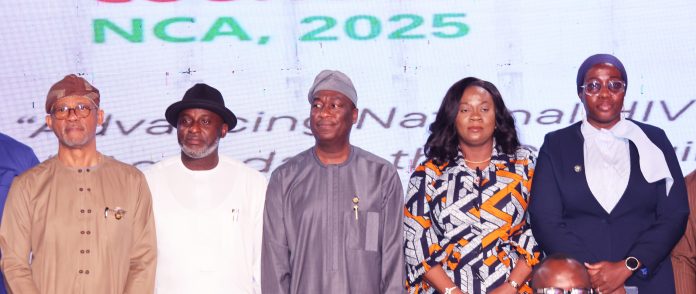…proposes institutionalization of quarterly Inter-SACA review meetings
Lagos State Governor, Mr. Babajide Olusola Sanwo-Olu, has called on State Legislatures across the nation to prioritize the passage and implementation of protective laws that guarantee sustained funding, end stigma, and support inclusive service delivery regarding persons with HIV.
Sanwo-Olu, who was represented by the Deputy Governor, Dr. Kadri Obafemi Hamzat, gave the charge today at the closing ceremony of the 7th National Council on AIDS (NCA), held at the Landmark Event Centre, Victoria Island, Lagos, calling for stronger inter-state collaboration and sustained federal leadership.
In addition, the Governor proposed the institutionalization of quarterly inter-SACA review meetings for the nation to continuously track progress and adapt swiftly, adding that the nation must shift from dependency to sustainability, from fragmented responses to coordinated systems, and from ad hoc programming to long-term strategic planning.
He said, “I also call on State Houses of Assembly across Nigeria to prioritize the passage and implementation of protective laws that guarantee sustained funding, end stigma, and support inclusive service delivery. We must shift from dependency to sustainability, from fragmented responses to coordinated systems, from ad hoc programming to long-term strategic planning.”
Sanwo-Olu also highlighted some of the measures the Lagos State Government has put in place to integrate HIV services into its broader health system, which includes expanding access to community-based testing and treatment, and strengthening linkages to care.
He revealed that the state government launched the Lagos State HIV Trust Fund as a bold step towards sustainable domestic financing, adding that his administration will continue to deepen collaboration with faith-based, traditional, and private sector actors.
“Our ongoing reform of the Lagos State HIV Anti-Stigma Law demonstrates our belief in dignity, inclusion, and justice for all persons living with HIV. We are aligning our HIV response with our Universal Health Coverage agenda because health must be equitable, accessible, and people-driven,” the Governor said.
Sanwo-Olu added that as global donor support gradually diminishes, it has become imperative for the nation to take full ownership of its national HIV response and build sustainable, resilient systems that can outlast policy shifts and funding cycles.
The Governor concluded that the Council must not become an annual routine, but must serve as a Launchpad for deeper commitment, wider ownership, and faster impact, urging that the experience gathered and resolution at the 3-day council meeting should not remain on paper; but they must find life in the nation’s budgets, its policies, its legislative actions, and above all, in the lives of the people.
In his goodwill message, Chairman, Federal House of Representatives Committee on HIV/AIDS, Tuberculosis & Malaria Control in Nigeria, Hon. Amobi Godwin Ogah, stated that the Committee will continue to advocate for increased domestic funding for the response against HIV in the country.
He noted that an estimated $8 billion is needed annually to sustain the fight against HIV/AIDS in the country, adding that the committee has continued to provide legislative support for the comprehensive sustainability of the HIV response.
The Lawmaker emphasized that ending the HIV epidemic requires not just improved diagnosis and treatment, but also attention to the broader health needs of people living with HIV. “Therefore, we in the Parliament will continue to advocate that the Nigerian government must take the lead in the fight against AIDS by increasing funding to the sector,” he stated
Earlier in her welcome address, Director General, National Agency for the Control of AIDS (NACA), Dr. Temitope Ilori, stated that the annual meeting is a testament to the agency’s commitment to address existing gaps in HIV policies and program implementation, ensuring that no one is left behind in its journey towards an AIDS-free Nigeria driven by ownership and sustainability.
Dr. Ilori pledged that the agency will continue to serve as Nigeria’s highest policy-making body for HIV/AIDS coordination, bringing together national and sub-national actors to align strategies for a sustainable HIV response.
She also stressed the need to accelerate the implementation of the National HIV, TB, and Malaria Sustainability Plan, ensuring that every Nigerian has access to comprehensive prevention, treatment, care, and support services.
She commended the Government of Lagos State for its commitment to integrate HIV services into its broader health system, describing that the government leadership in the health sector is truly inspiring.
In his address, the Lagos State Commissioner for Health, Prof. Akin Abayomi, urged the Nigerian government to prioritize strengthening domestic resource mobilization and ensuring that HIV funding is institutionalized at both the national and sub-national levels. He stated that sustainability extends beyond financial resources, emphasizing the need for stronger leadership, adaptive systems, innovation, and accountable governance.
The Commissioner, therefore, reaffirmed the State Government’s commitment to reducing mother-to-child transmission and scaling up treatment and prevention initiatives. “As a country and as states, we must take ownership. We must ensure HIV care becomes cheaper, more accessible, and integrated into routine health services. And we must treat HIV as a public health security priority,” he added.















